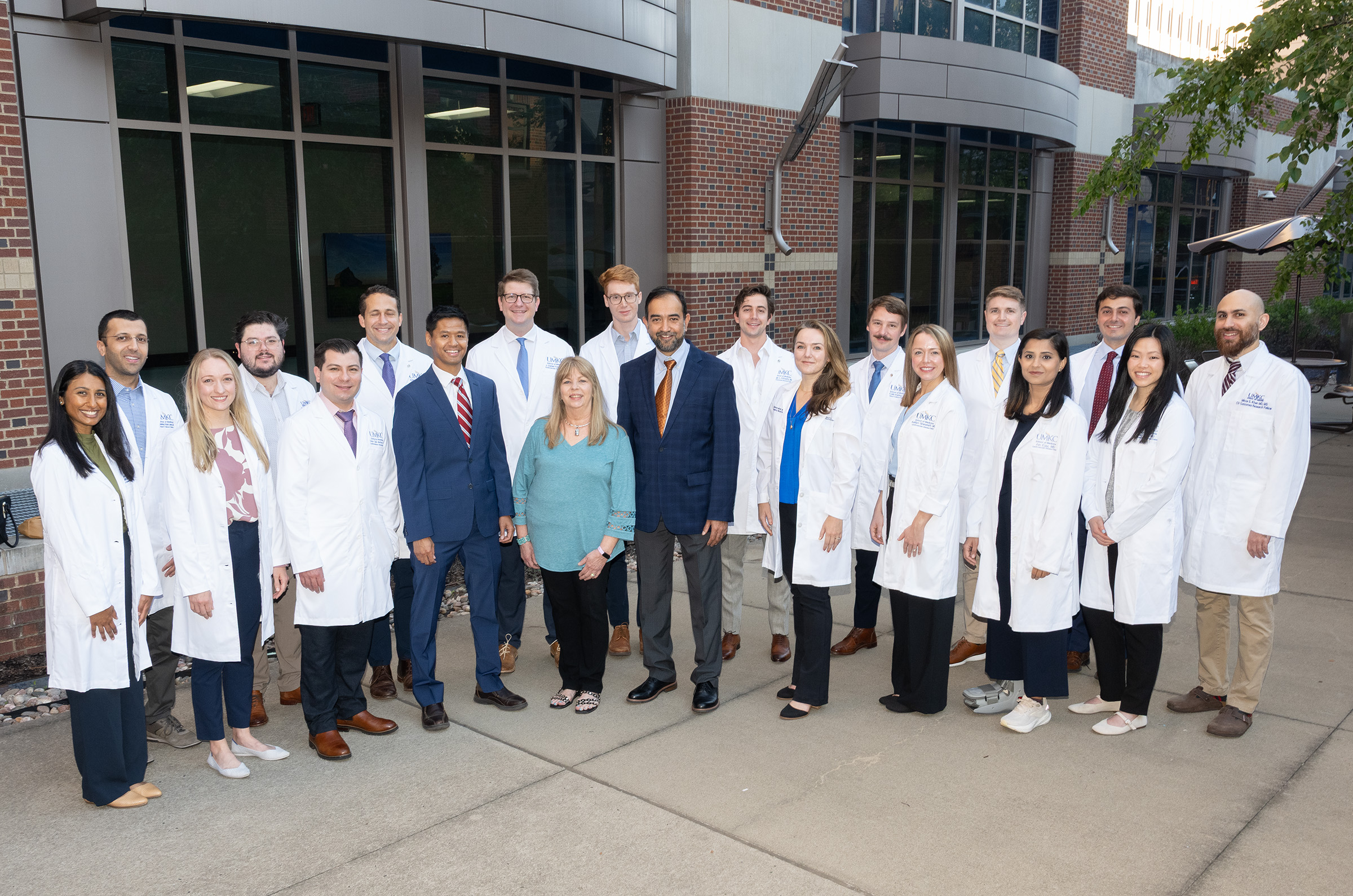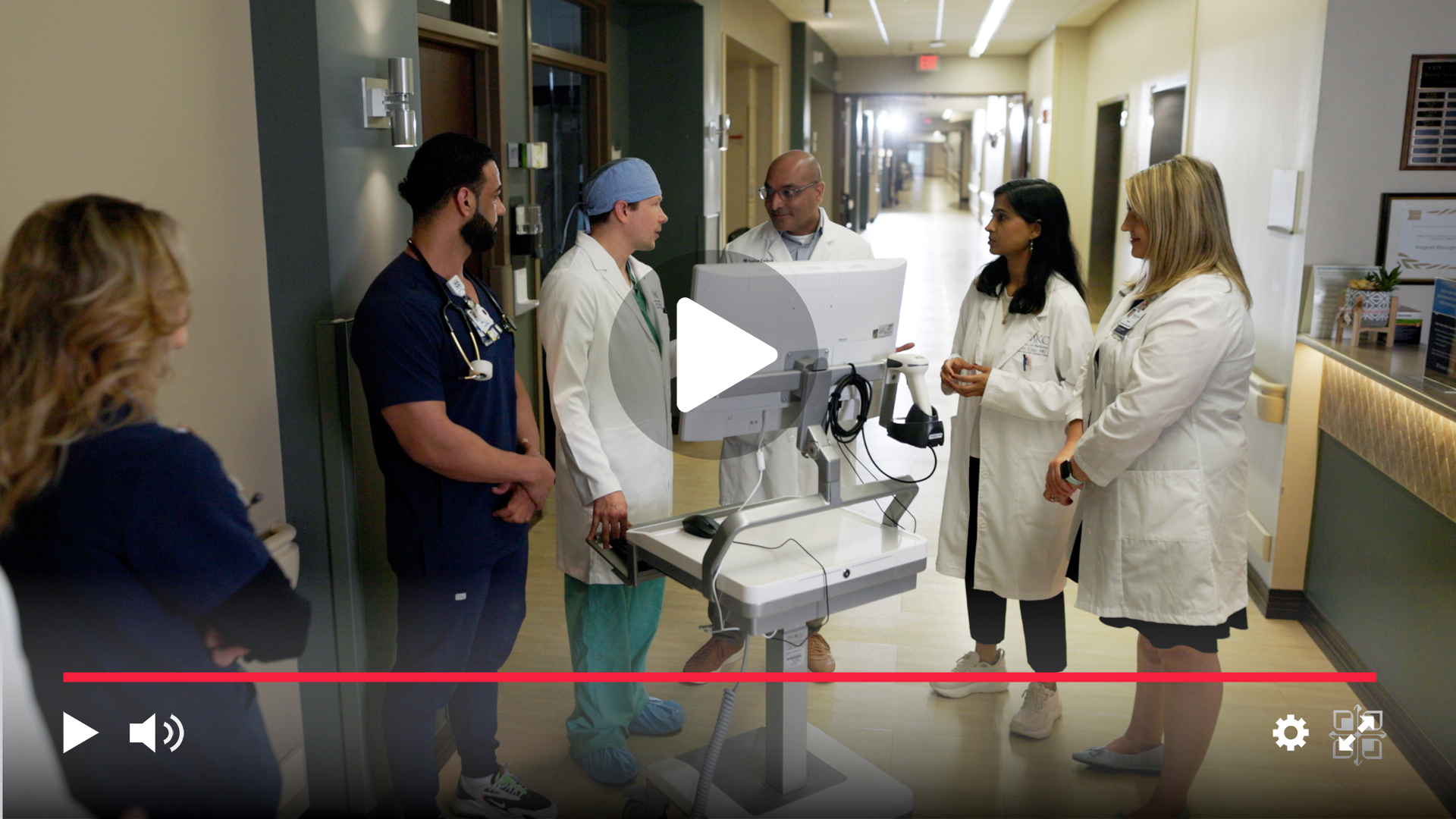Cardiovascular Disease Fellowship
Fellows at the University of Missouri-Kansas City School of Medicine and Saint Luke’s are mentored by national and international leaders in the cardiology field. Our primary training site is Saint Luke's Mid America Heart Institute, located at Saint Luke's Hospital of Kansas City near the Country Club Plaza.

Our fellowship program has ranked among the top 10 in the United States by the National In-Training Exam, and training is diversified by clinical experiences at University Health Truman Medical Center, a safety-net hospital and the primary teaching institution of the University of Missouri–Kansas City School of Medicine.
Opportunities for clinical research rival the most prestigious academic institutions in the country. Saint Luke’s Mid America Heart Institute stands alongside only Harvard, Yale, and Duke as one of the few centers designated by the American College of Cardiology (ACC) to be an analytic center for the National Cardiovascular Data Registry (NCDR).
With Saint Luke’s top-notch clinical and research training, fellows are prepared to excel in any hospital setting or subspecialty after graduation.

Fellowship Information
Training
The Cardiovascular Disease Pathway is a three-year program aimed at preparing clinicians with broad exposure to all aspects of contemporary cardiovascular medicine.
Combined Clinical Cardiology and Outcomes ResearchThe Combined Clinical Cardiology and Outcomes Research Pathway is a 4-year fellowship designed for trainees interested in integrating outcomes research with clinical training (two years of T32 plus two years of clinical cardiology). Combined Clinical Cardiology and Outcomes Research Pathway is for trainees interested in integrating outcomes research with clinical training (two years of T32 plus two of clinical cardiology).
Combined Cardiovascular Disease and Electrophysiology PathwayThe Combined Cardiovascular Disease and Electrophysiology Pathway is a 4-year fellowship track designed for fellows interested in electrophysiology, including two years of general cardiology plus two years of electrophysiology.
Exceptional Education OpportunitiesContemporary educational methods and resources used in cardiovascular disease fellowship training include:
- UMKC simulation center—there are plans for an additional dedicated Heart Institute cardiovascular simulation center
- Blended learning is fully integrated into curriculum (blending live and online asynchronous education) to maximize learning
The program provides opportunities for earning various graduate degrees and certificates, including:
- Master's of Science in Clinical Research for future physician-scientists
- Master's of Education in Health Professions for future clinician-educators
- Executive MBA for future physician leaders/administrators
- Graduate certificate in quality improvement and implementation science
Online learning resources include:
- Cardiosource (including ACCSAP, CathSAP, EchoSAP, EP SAP, HF SAP, ECG Drill & Practice, Nuclear Cardiology)
- Mayo Board Review supported by a generous grant from CPKC.
- Cardiovillage
- O’Keefe ECG, supported by James O’Keefe, MD
- Kelabs Echocardiography
- Society for Cardiovascular Magnetic Resonance
- Society of Cardiovascular Computer Tomography
Hospitals
Fellows in the general cardiology training program rotate at Saint Luke's Mid America Heart Institute and University Health Truman Medical Center to ensure exposure to diverse care settings and patient populations.
Saint Luke's Mid America Heart InstituteSaint Luke’s Mid America Heart Institute is the primary training site for cardiology fellows. Fellows are exposed to each subspecialty within cardiovascular medicine by working with the Institute's more than 60 attending cardiologists. The Heart Institute is a high-volume tertiary care center with a large, diverse referral base. Fellows will be exposed to the full spectrum of cardiovascular diseases.
Saint Luke's Mid America Heart Institute offers a host of cardiac training opportunities, including high-volume cardiac imaging laboratories (echocardiography, nuclear cardiology including SPECT, PET, MRI, and cardiac and vascular CT), and interventional procedures (coronary, peripheral vascular, and structural including the latest techniques such as transcutaneous aortic valve replacement).
Fellows also can work in electrophysiology (device therapy, atrial and ventricular arrhythmia diagnostic and therapeutic procedures) and advanced heart failure services (including ventricular assist devices, and a high-volume transplant center).
Saint Luke’s Mid America Heart Institute features one of the most active clinical cardiovascular research programs in the country. Clinical researchers from a host of programs, including cardiovascular outcomes research; health economics and technology assessment; interventional; imaging; and heart failure publish more than 200 peer-reviewed articles annually and are actively involved in the latest clinical trials and observational research.
Originally founded in 1981, the Heart Institute is the home of pioneering work in the field of interventional cardiology, including the first acute infarct angioplasty performed by Geoffrey Hartzler, MD. Over time, it has expanded to include all cardiovascular disciplines, and its staff regularly hold prominent national positions within several cardiovascular subspecialty organizations.
University Health Truman Medical CenterUniversity Health Truman Medical Center, the main training hospital for University of Missouri–Kansas City School of Medicine, is a 194-bed hospital that provides a complementary educational experience for cardiology fellows through exposure to different cardiovascular pathologies commonly encountered in inner-city and urban settings. University Health Truman Medical Center boasts a growing and active cardiovascular diseases department. Fellows work closely with attending physicians on general consultative cardiology rotations; in the cardiac catheterization lab; on non-invasive imaging rotations; and in cardiology outpatient clinics.
University Health Truman Medical Center, which is a STEMI center, offers the full range of cardiovascular services including echocardiography, nuclear stress testing, cardiac CT, and coronary and peripheral interventions. Fellows experience strong autonomy with excellent reinforcement from bedside and didactic teaching by the cardiology faculty.
Conferences
Education is at the forefront at the University of Missouri–Kansas City School of Medicine and Saint Luke’s Mid America Heart Institute cardiology training program. High volume, hands-on clinical experience is coupled with a series of conferences designed to augment and extend principles taught at the bedside.
The conference schedule includes a combination of didactic lectures, case-based conferences, journal club, and a Morbidity & Mortality conference, in addition to rotation-specific conferences (cath, echo, cardiac CT, and nuclear).
Fellows Conference is held daily and includes active participation from attending physicians with subspecialty expertise in each discipline. The conference schedule also includes a weekly, multidisciplinary cardiovascular grand rounds, frequently featuring lectures by national leaders within cardiovascular medicine and cardiac surgery.
Night Call and Weekend Coverage
Fellows take night-call coverage from home for University Health Truman Medical Center during the course of their training. Fellows average three to four nights per month when not rounding on core clinical services during the first and second years and once a month during the third year. Compensation is provided for night and weekend coverage at Saint Luke’s Hospital. This opportunity is voluntary, and most fellows choose to participate for additional learning and compensation.
WeekendsFirst- and second-year fellows cover one weekend per month. Traditionally, first-year fellows cover Saint Luke’s Hospital on the weekend and second-year fellows cover the weekends at University Health Truman Medical Center. Third-year fellows have no scheduled weekend coverage.
Achievements and Accolades
- The fellowship program was ranked among the top 10 in the United States based on ACC In-Training examination performance in 2019
- Saint Luke's offers an NIH-funded T32 training program in cardiovascular outcomes research.
- Numerous fellows are recipients of Young Investigator Awards and various other national awards, honors, and grants.
- The program's distinguished faculty include recipients of some of the most prestigious awards from the American Heart Association including the Distinguished Scientist and Lifetime Achievement Awards.
- Faculty members have been named among Thompson-Reuters’ Greatest Scientific Minds.
- CVD Fellowship Program Director (PD) and Program Coordinator (PC) served as invited contributors to ACC’s comprehensive guide on how to be a cardiology fellowship program director.
- The PD has been an invited speaker to the ACC Program Director Symposium.
- The PD served as a question writer for the ACC, contributing questions used for the ITE, ACCSAP, and ABIM.
- The PC has served on the Board of Fellowship Administrators in Cardiovascular Education and Training since its inception in 2014.
- One of the first three hospitals in the U.S. to achieve Comprehensive Cardiac Center certification from The Joint Commission.
- In addition to Saint Luke's Mid America Heart Institute being designated by the ACC as an analytic center for NCDR, the Heart Institute also leads and/or participates in numerous national and international clinical trials.
- Saint Luke’s is a pioneer in the field of interventional cardiology, including in complex, higher-risk and indicated PCI (CHiP) interventions, treating chronic total occlusions (CTOs), and robotic-assisted PCI.
- Saint Luke's leads the way in CV medical education. EKG interpretation is taught by cardiologist James O’Keefe, MD, the author of The Complete Guide to ECGs, which is used by nearly every cardiology fellow in the US.
- The use of PCI in acute myocardial infarction (AMI) was first pioneered by Saint Luke’s cardiologist, Geoffrey Hartzler, MD, in 1979.
- Saint Luke's has expert researchers in structural heart disease. The faculty served as authors, investigators, or principal investigators in landmark trials including the PARTNER 1, 2, and 3 trials, COAPT, PROTECT-AF, PREVAIL, and others.
- The faculty includes multiple international leaders in advanced CV imaging, such as former presidents and the current president-elect of the American Society of Nuclear Cardiology (ASNC).
- In addition to producing several hundred peer-reviewed publications and guideline documents, the faculty and their work also have been featured in The New York Times and other prominent media.
- The Heart Institute is one of the top 15 adult heart transplant centers, based on volume, in the US and is the only top 15 heart transplant center in the Midwest.
- Saint Luke's Muriel I. Kauffman Women’s Heart Center, established in 1994, was the first center of its kind in the United States. As such, it was recognized in two White House receptions for taking a proactive role in addressing women’s heart health.
Eligibility
Due to University of Missouri–Kansas City policy, applicants with H1B visas are not accepted. No J1 visa holders due to moonlighting call. Only U.S. citizens and permanent residents/green card holders are eligible to apply.
- Applicant must have completed an ACGME approved Internal Medicine Residency Program or Subspecialty Program
- A completed application form through the Electronic Residency Application Service (ERAS)
- At least three letters of recommendation; one from his/her current Program director
- A completed personal statement
- Active in research and scholarly activities
- Applicant must be eligible for a permanent Missouri license
- Applicant must be ABIM certified or eligible prior to beginning of fellowship
Application Process
Applications are accepted through the Electronic Residency Application Service (ERAS) from July 15 to Aug. 15. Applying for multiple tracks is possible through ERAS, but please apply only to the track(s) you are interested in, and for which you think you are best suited.
If, during the application/interview process, it becomes clear that another track is more appropriate, requests to switch tracks will be considered.
We encourage applicants to contact the program coordinator if they have questions about which track is most appropriate for them.
A complete application will include the following documents:
- ERAS Common Application Form
- Photograph
- Personal statement
- Curriculum vitae
- Copy of USMLE or COMLEX transcript
- Copy of ECFMG certificate (if applicable)
- MSPE (Dean’s letter)
- Medical school transcript
- Three letters of recommendation, one of which must be from your current or prior residency program director
- Interviews are held in September through early November. The fellowship program participates in the National Resident Matching Program (NRMP).
More information
We welcome your interest in the Cardiovascular Disease Fellowship. For more information, contact Jeanette Wheeler, C-TAGME, Program Manager, Cardiovascular Fellowship Programs at [email protected] or 816-932-5475.